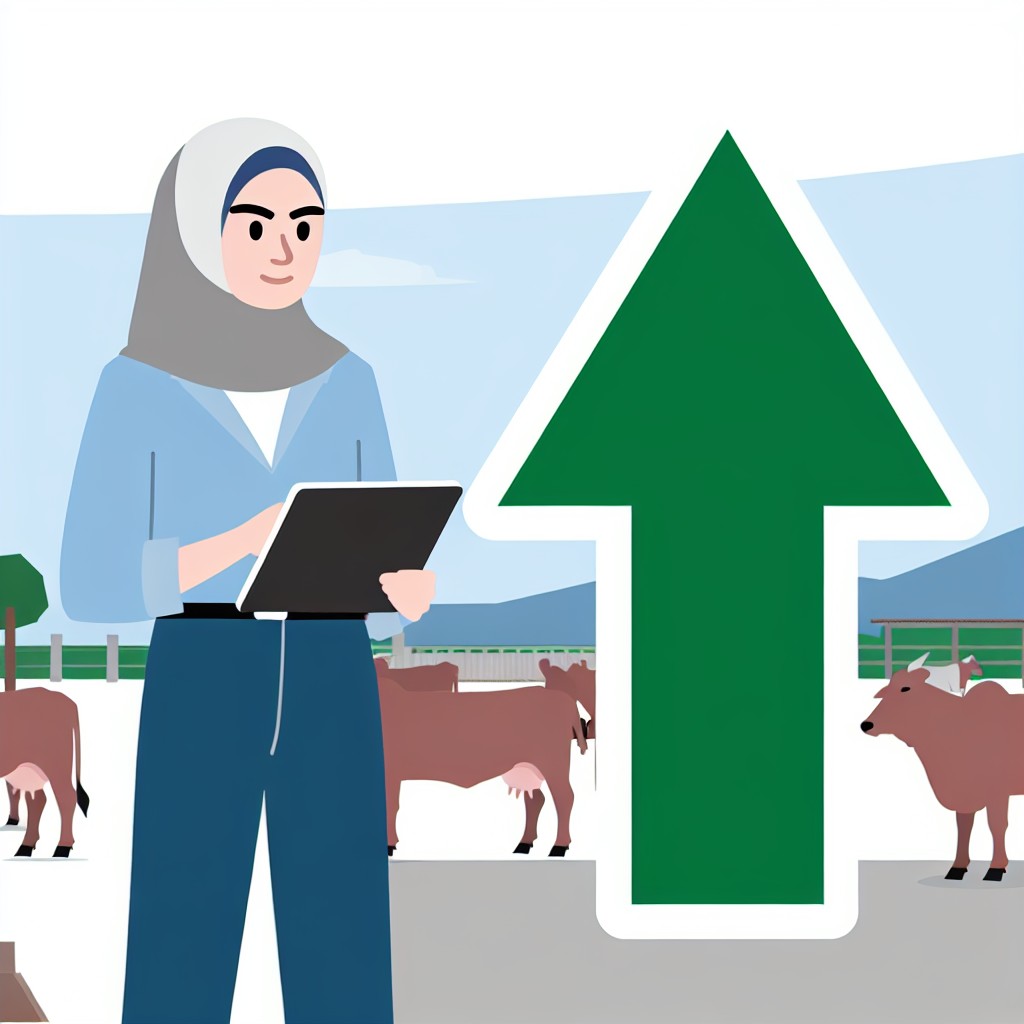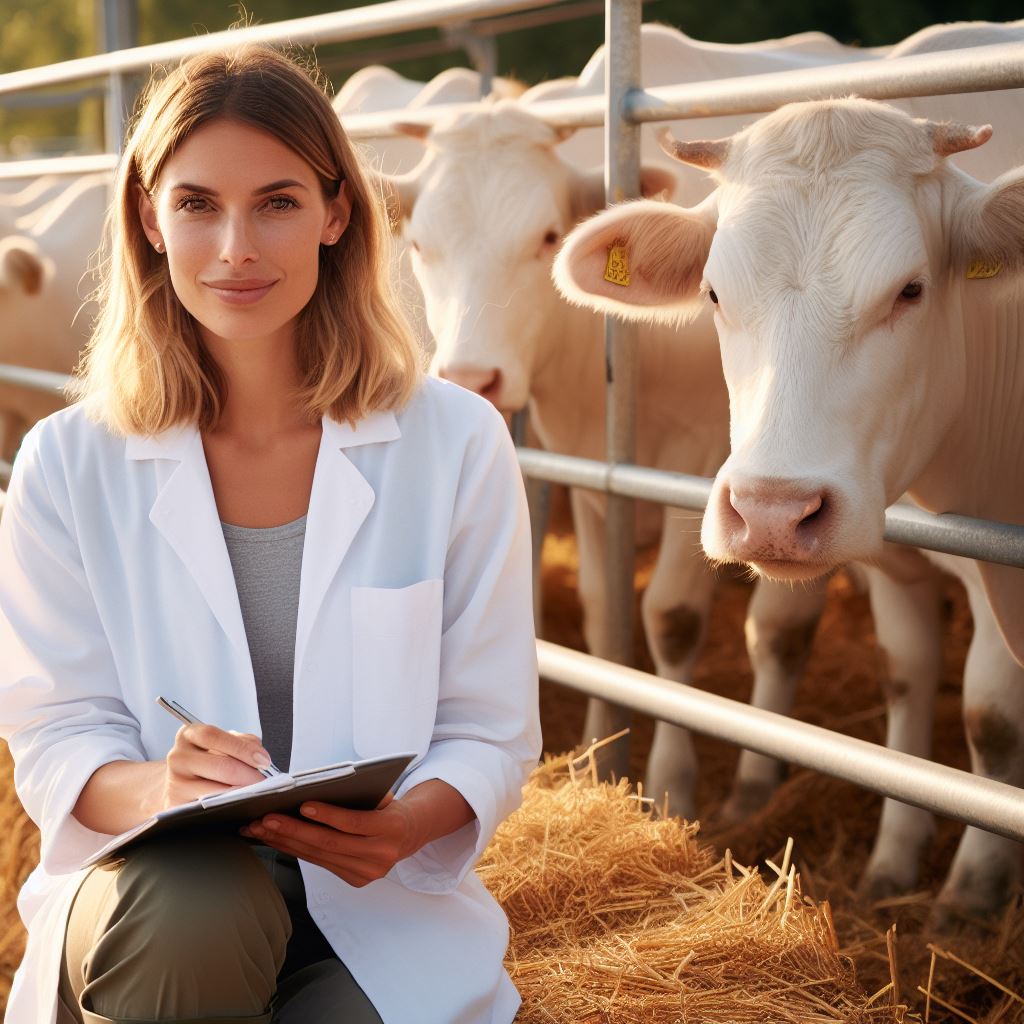Proper livestock management is essential for the health and productivity of farm animals.
It ensures optimal care, nutrition, and breeding for better outcomes.
In this post, we will explore the benefits of professional livestock management.
Improved Animal Health
Professional livestock managers have the expertise to detect and prevent diseases in animals.
Regular check-ups and vaccinations are essential for maintaining healthy livestock.
Increased Productivity
Proper management practices lead to improved growth rates and higher yields in livestock.
Well-fed and well-cared-for animals are more likely to produce high-quality products.
Efficient Resource Utilization
Professional managers can optimize feed, water, and space usage for maximum efficiency.
Reducing waste and implementing sustainable practices benefit both the animals and the environment.
Expert Breeding Programs
Professional livestock managers develop breeding programs to enhance genetic traits in animals.
This leads to superior offspring with desirable characteristics for the market.
Compliance with Regulations
Professional livestock managers ensure that farm operations comply with industry regulations and standards.
This helps avoid fines, penalties, and reputation damage due to non-compliance.
Enhancing Farm Profitability through Management
By investing in professional livestock management, farmers can improve their overall profitability.
Healthy, productive animals lead to higher returns on investment and long-term success in the industry.
Improved Animal Health and Well-being
- Regular monitoring and care provided to animals
- Reduction in diseases and infections
- Ensuring proper nutrition and living conditions
Professional livestock management plays a crucial role in ensuring the overall health of animals.
It also contributes to their well-being under professional care.
Here are some specific ways professional livestock management improves animal health.
Regular Monitoring and Care Provided to Animals
One key benefit of professional livestock management is regular monitoring of animals.
This practice tracks their health status and behavior consistently.
Transform Your Career Today
Unlock a personalized career strategy that drives real results. Get tailored advice and a roadmap designed just for you.
Start NowProfessionals are trained to detect early signs of illness or distress.
Such early detection allows prompt intervention and treatment.
Reduction in Diseases and Infections
Livestock managers implement disease prevention and biosecurity measures.
They follow strict protocols and hygiene practices to reduce disease risks.
This effort promotes health of individual animals and protects entire herds.
It also helps safeguard flocks from potential outbreaks.
Ensuring Proper Nutrition and Living Conditions
Proper nutrition is essential for maintaining livestock health and productivity.
Managers develop customized feeding programs for different animals.
They ensure animals live in clean, comfortable, and suitable environments.
These living conditions promote animal well-being effectively.
When it comes to professional livestock management, one of the key benefits is increased productivity.
This can be achieved through various strategies and practices that focus on optimizing the health and performance of livestock.
Efficient Breeding Programs
Professional livestock managers develop and implement efficient breeding programs tailored to the specific needs of the operation.
They carefully select breeding stock and use advanced techniques such as artificial insemination.
This improves the genetics of the herd or flock, resulting in higher-quality offspring with desirable traits.
Timely Vaccinations and Treatments
Another important aspect is the timely administration of vaccinations and treatments.
This prevents the spread of diseases and infections, ensuring the animals’ health and wellbeing.
By following a strict schedule and using only approved medications, managers significantly reduce the risk of illness and mortality.
Enhancing the Quality and Quantity of Livestock Products
By implementing best practices in nutrition, housing, and overall care, managers can enhance product quality and quantity.
This includes improving the taste, texture, and nutritional value of meat, milk, eggs, and other products.
Transform Your Career Today
Unlock a personalized career strategy that drives real results. Get tailored advice and a roadmap designed just for you.
Start NowThey also increase the overall yield from each animal.
Paying close attention to feed quality, water supply, and environmental conditions ensures healthy and productive livestock.
This results in a higher return on investment.
Maximizing Productivity and Profitability in Livestock Operations
Professional livestock management offers many benefits to improve productivity and profitability.
Focusing on efficient breeding programs, timely vaccinations, and treatments maximizes herd and flock potential.
Enhancing the quality and quantity of livestock products leads to long-term success.
Discover More: Agricultural Economists and Organic Farming Economics
Cost-effectiveness
- Prevention of diseases saves on medical expenses
- Optimal feeding strategies
- Minimizing wastage of resources
Reduced Medical Expenses
One of the key benefits of professional livestock management is the prevention of diseases.
Implementing proper vaccination programs and regular health check-ups reduces illnesses among livestock.
This approach leads to lower medical expenses because fewer veterinary treatments are needed for sick animals.
Optimal Feeding Strategies
Professional livestock managers develop feeding strategies tailored to each animal’s specific needs.
They provide balanced diets and ensure proper nutrition to improve livestock health and productivity.
This practice optimizes feed resource use and generates cost savings in the long term.
Minimizing Wastage of Resources
Cost-effectiveness also comes from minimizing resource wastage in livestock management.
Careful monitoring of consumption patterns allows adjustment of feed rations to prevent overfeeding.
Such control maximizes feed utilization efficiency and reduces overall production costs.
Uncover the Details: Health and Safety Tips for Agricultural Laborers
Environmental sustainability is a critical aspect of professional livestock management.
It involves implementing practices that promote the long-term health of the environment.
These practices also maximize productivity for livestock producers.
Transform Your Career Today
Unlock a personalized career strategy that drives real results. Get tailored advice and a roadmap designed just for you.
Start NowProper Waste Management Practices
Livestock operations produce significant waste including manure, feed waste, and bedding materials.
Proper waste management practices are essential to minimize environmental impacts.
Implementing effective techniques such as composting manure improves nutrient recycling.
Recycling feed waste also reduces pollution and nutrient runoff into waterways.
These strategies protect soil and water quality.
Thus, they benefit both the environment and surrounding communities.
Strategies for Reducing Greenhouse Gas Emissions
Livestock production contributes significantly to greenhouse gas emissions.
Methane from enteric fermentation in ruminant animals is a primary source.
Professional livestock management can help reduce these emissions effectively.
Optimizing feed formulations plays an important role in this reduction.
Improving herd health also minimizes the environmental impact of livestock operations.
Applying best management practices contributes to sustainability in agriculture.
Preserving Natural Resources through Sustainable Livestock Management
Professional livestock management preserves crucial natural resources like land, water, and biodiversity.
Sustainable practices ensure these resources remain available for future generations.
Rotational grazing techniques improve land use and soil health.
Efficient irrigation systems help conserve water resources.
Protecting wildlife habitats supports biodiversity within livestock areas.
Such strategies enhance the resilience and sustainability of livestock operations.
Environmental Benefits and Long-Term Viability of Livestock Operations
Environmental sustainability is a vital benefit of professional livestock management.
Proper waste management, reduced greenhouse gas emissions, and resource preservation work together.
Transform Your Career Today
Unlock a personalized career strategy that drives real results. Get tailored advice and a roadmap designed just for you.
Start NowThese efforts protect the environment and support continued productivity.
Livestock producers must prioritize sustainability in their practices.
This ensures a healthy and productive future for both their businesses and the planet.
Delve into the Subject: How to Measure Conservation Success
Professional livestock management plays a crucial role in enhancing the profitability of livestock farms.
Here are some key reasons why.
Higher quality products fetch better prices
Professional livestock managers are skilled in implementing best practices that improve the overall quality of products.
They ensure that the livestock is well cared for and receives proper nutrition.
The quality of the end products such as meat, milk, or eggs is significantly enhanced.
As a result, these high-quality products can command better prices in the market.
This leads to increased profitability for the farm.
Greater efficiency in operations
Professional livestock managers are trained to optimize farm operations to ensure maximum efficiency.
They are proficient in managing resources such as feed, water, and land effectively.
Minimizing wastage and maximizing output is a key focus area.
By streamlining operations, farms can produce more with less.
Ultimately, this increases profitability through cost savings and improved productivity.
Reduced risk of economic losses
Professional livestock managers are adept at identifying and mitigating potential risks on the farm.
They are skilled in disease prevention, monitoring animal health, and implementing biosecurity measures.
These measures minimize the likelihood of illness outbreaks.
By proactively managing risks, farms can avoid economic losses due to disease outbreaks or productivity declines.
Transform Your Career Today
Unlock a personalized career strategy that drives real results. Get tailored advice and a roadmap designed just for you.
Start NowThis safeguards profitability in the long run.
Benefits of professional livestock management for sustainable profitability
Professional livestock management is essential for enhancing profitability on livestock farms.
Focusing on improving product quality boosts market value.
Increasing operational efficiency helps reduce costs and increase output.
Mitigating economic risks protects farms from unforeseen losses.
These factors together help farmers achieve sustainable and profitable outcomes in their operations.
See Related Content: Agricultural Economists in Rural Development

Reputation and Brand Building
- Meeting quality standards and regulations
- Building trust with customers
- Establishing a strong market presence
Livestock management professionals ensure animal care meets industry standards.
This guarantees animal well-being and meets regulatory quality expectations.
Customers trust professionals to provide the best care for their animals.
This trust creates loyalty and encourages repeat business and referrals.
Professional livestock management helps businesses establish strong market presence.
High-quality standards differentiate businesses and attract larger customer bases.
This leads to increased sales and improved long-term profitability.
Investing in professional livestock management supports animal welfare and business reputation.
Meeting standards, building trust, and establishing market presence ensure long-term success in livestock industries.
Time Management
Professional livestock management offers numerous benefits.
It includes improved time management for livestock owners.
By entrusting the care and management of their livestock to professionals, owners can streamline daily tasks and routines.
They can also implement efficient scheduling practices and achieve a better work-life balance.
Transform Your Career Today
Unlock a personalized career strategy that drives real results. Get tailored advice and a roadmap designed just for you.
Start NowStreamlining Daily Tasks and Routines
One key advantage of professional livestock management is the ability to streamline daily tasks and routines.
Livestock professionals have expertise and experience to efficiently care for animals.
They handle feeding schedules, monitor health and wellness, and manage necessary treatments or medications.
This level of efficiency can significantly reduce the time and effort required by livestock owners.
By delegating responsibilities to professionals, owners can focus on other aspects of their business or personal life.
Implementing Efficient Scheduling Practices
Professional livestock managers adeptly implement efficient scheduling practices to optimize animal care and well-being.
From feeding schedules to herd management activities, professionals create structured routines.
These routines ensure all tasks are completed in a timely manner.
With a well-organized schedule, livestock owners can be assured their animals receive necessary care and attention.
This allows owners peace of mind knowing their livestock management is in capable hands and running smoothly.
Benefits of Improved Work-Life Balance for Livestock Owners
One of the most significant benefits of professional livestock management is a better work-life balance for owners.
By outsourcing day-to-day care of animals, owners free up valuable time for other priorities.
This improved balance can lead to reduced stress and better overall well-being for livestock owners.
Owners gain peace of mind knowing their animals are well cared for.
They can more fully enjoy personal time or focus on growing their business without feeling overwhelmed.
Overall Advantages of Professional Livestock Management
Professional livestock management offers many benefits, including improved time management for owners.
By entrusting animal care to professionals, owners streamline daily tasks and implement efficient scheduling practices.
This approach helps owners achieve a better work-life balance for reduced stress and improved well-being.




